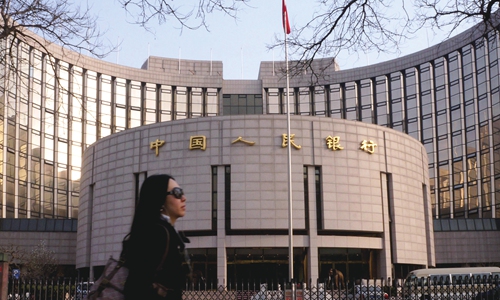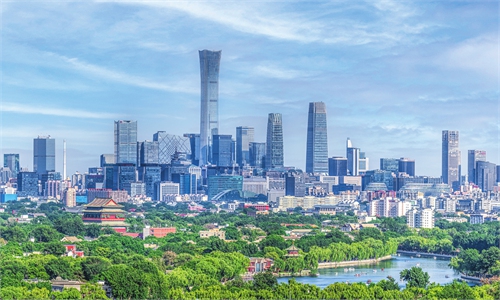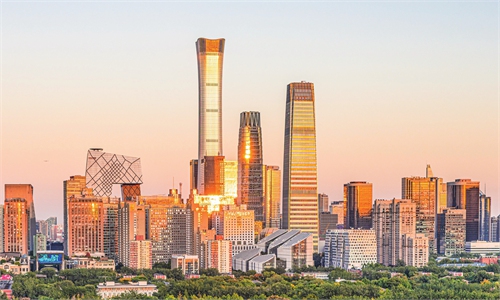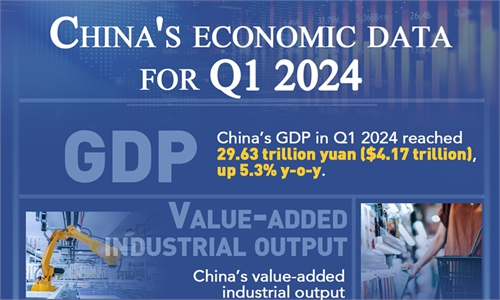China on right track to achieve full-year GDP goal with stepped-up monetary policy
Experts upbeat about achieving full-year GDP growth target

The building of the People's Bank of China in Beijing Photo: VCG
The People's Bank of China (PBC) on Monday ramped up its monetary policy, including cuts in a key short-term rate and market-based benchmark lending rates, in the latest move to strengthen counter-cyclical adjustment and increase support for the real economy.
Analysts said the decisive move at a critical moment shows the bank's resolve to bolster sustained economic growth. The move also echoes the just-concluded third plenary session of the 20th Central Committee of the Communist Party of China (CPC), which stressed that the country must remain firmly committed to accomplishing the goals for this year's economic and social development.
Dismissing Western media outlets' smearing of the Chinese economy, analysts said that the Chinese authorities are moving in the right direction to achieve the GDP growth target of about 5 percent, since stepped-up fiscal and monetary policies will revive market confidence and boost effective demand.
Starting from Monday, the interest rate on seven-day reverse repos - a widely used liquidity injection tool - was cut from 1.8 percent to 1.7 percent, in a bid to strengthen counter-cyclical adjustments to better support the real economy, according to a statement on the central bank's website.
It was the first reduction since August 2023.
The central bank held the reverse repo rate and medium-term lending facility rate intact since August to stabilize the yuan's exchange rate and prevent risks. However, given growing pressure on the economy, especially weak demand, counter-cyclical adjustments should be strengthened, Wen Bin, chief economist at China Minsheng Bank, told the Global Times on Monday.
"The central bank's decisive move reflects its determination to bolster economic growth. It also echoes the Chinese authorities' firm commitment to accomplishing the goals for this year's economic and social development, stressed during the just-concluded third plenary session," Wen said.
PBC Governor Pan Gongsheng said in June that the bank will continue to reform market-based interest rate adjustment mechanisms, for example, by using a single short-term rate as a main policy rate to guide markets.
Analysts said that lower interest rates will flow through the markets to the real economy, which will help reduce the real economy's comprehensive financing costs, revive social expectations and consolidate the economic recovery's momentum.
On Monday, the PBC cut the one-year loan prime rate (LPR) to 3.35 percent from 3.45 percent, while cutting the over-five-year LPR by 10 basis points to 3.85 percent, according to a separate statement on the PBC website.
These figures, released each month, serve as pricing reference rates for banks. "Monday's cut can save about 57 yuan in monthly payments, or about 21,000 yuan in total, for a new homebuyer with a 30-year mortgage of 1 million yuan," Yang Delong, chief economist at Shenzhen-based First Seafront Fund, told the Global Times on Monday. The move will help stabilize the real estate sector.
"Following the third plenary session, policies to stabilize growth will be gradually rolled out, and as a result, China's economic recovery is expected to strengthen in the second half of the year," Yang said.
China's GDP grew 5 percent year-on-year in the first half of 2024 to about 61.68 trillion yuan ($8.48 trillion), data from the National Bureau of Statistics showed on July 15.
Analysts expressed confidence that China can achieve its economic growth targets in 2024, noting that the Chinese people have always pulled through difficult times and achieved new progress, and China's institutional advantages and the CPC's leadership will allow the country's economic miracle to continue.
Wan Zhe, an economist and professor at the Belt and Road School of Beijing Normal University, rebuked some Western media reports claiming the PBC's rate cuts ahead of the US Federal Reserve's reflect downward pressure on China's economy.
"Amid global economic uncertainties and imbalances, rates are being cut in many economies, for example, the EU and Canada. China is undergoing a transition from old to new growth drivers, which needs policy support to raise expectations and drive effective demand," Wan told the Global Times on Monday.
To achieve the around 5 percent GDP growth goal, more macro-policies are needed to stabilize growth in the second half, Xu Gao, chief economist at Bank of China International, told the Global Times on Monday.
Another more effective choice for stabilizing economic growth is setting up a fund of 1-2 trillion yuan to bail out real estate developers and get the industry back to normal, so as to stop the trend of contracting demand in the economic operation, according to Xu.
China will accelerate efforts to build a high standard market system, which is a major reform task for the country, Han Wenxiu, executive deputy director of the Office of the Central Committee for Financial and Economic Affairs, said at a press conference on Friday.
He said that efforts will be made to build a unified national market, including the development of a unified urban-rural construction land market, a nationwide integrated technology and data market, and a unified national electricity market.
A new round of reform and opening-up will build a sound institutional environment for all businesses and boost their confidence to expand investment and seek greater development, Wan said, noting that forceful reforms from the world's second-largest economy will inject stability into the world amid a sluggish economic recovery.




